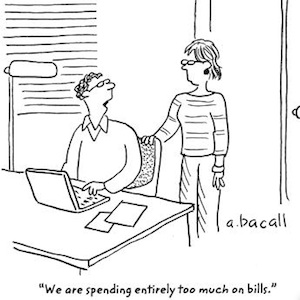Government Budget Battle In Household Budget Terms
 The budget war in DC is political posturing and nothing more. Money manager Michael Ashton, who goes by Inflation_Guy on Twittter, wrote a great piece breaking down the issue in terms we can all understand. Below are those excerpts from his must-read full budget piece:
The budget war in DC is political posturing and nothing more. Money manager Michael Ashton, who goes by Inflation_Guy on Twittter, wrote a great piece breaking down the issue in terms we can all understand. Below are those excerpts from his must-read full budget piece:
Incredibly, the U.S. government is 24 hours away from a partial shutdown and furlough of 800,000 “non-essential personnel.” The battle is between the Republicans’ proposal to cut $61bln from the deficit and the Democrats’ $33bln proposal. The Republicans, controlling the House of Representatives, insist on their number; the Democrats say this would destroy the economy, old people, and orphan children with a limp.
Now, I can tell you that the 2012 budget expenditures as proposed by the President are supposed to be $3.7 trillion, and point out that these two numbers are literally rounding error, but the numbers are so big as to be meaningless. So let me try a couple of images.
Let’s suppose that in 2008 your household had an income of $50,000. In 2009, you got a raise to $53,500; in 2010 you got a raise to $62,000; and in 2011 you got a raise to $65,500. Nice job; in three years you’ve gotten a 31% raise. Now the company comes on hard times, and they ask you to take a pay cut to $64,500. So you quit, of course, rather than take the pay cut.
Or, let’s say that ten years ago you weighed in at 190 pounds. Well, you’ve sort of let yourself go and you now weigh 380 pounds. But you can advance to the next round on The Biggest Loser if you can trim six pounds over the next year. “Forget it,” you say. “I love my Haagen-Dazs!”
That’s the scale of what we are talking about here. In the first example, your 31% rise in salary over 3 years matches the 31% rise in federal outlays over the same time period, and the $1,000 pay cut is roughly equivalent to $61bln/$3.8trillion in FY 2011 outlays. In the second example, your doubling in weight echoes the doubling of federal outlays from the 2001 budget ($1.9 trillion) to the 2011 budget and the 6 pounds out of 380 is akin to $61 from $3.8 trillion.
…
And does this problem start to sound anything like what Portugal experienced? Greece? Enron? It isn’t the balance sheet that fells most countries and companies – it’s the cash flow statement.
Is there a way out? Not a pretty one. Cutting hard on the deficit might well stimulate the economy after the initial harsh blow, but if our leaders are arguing over $61bln or $33bln I doubt we will soon see $500bln pass.
